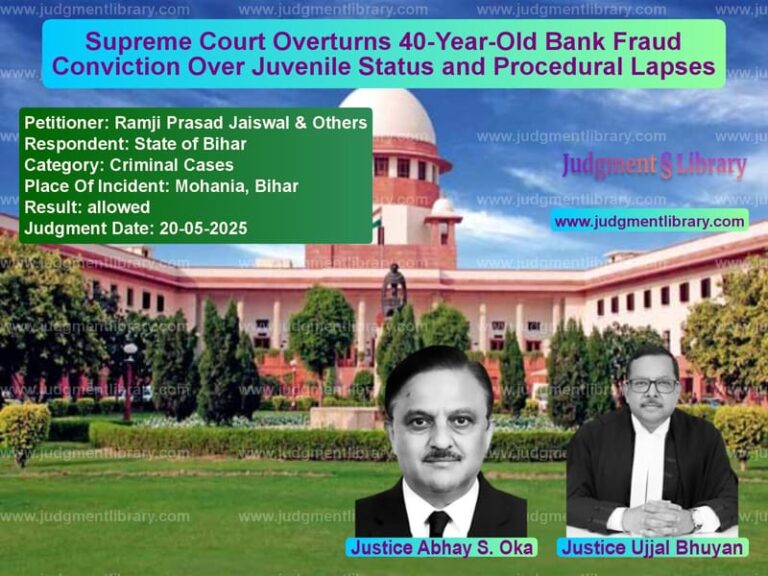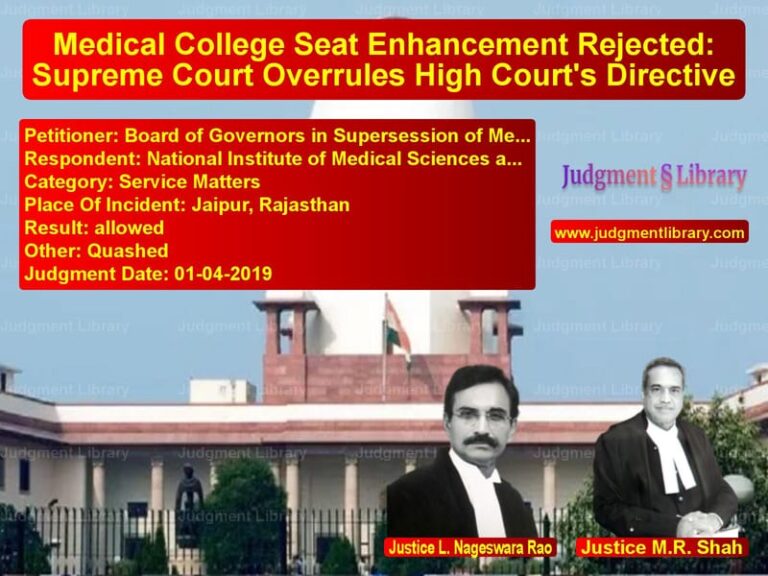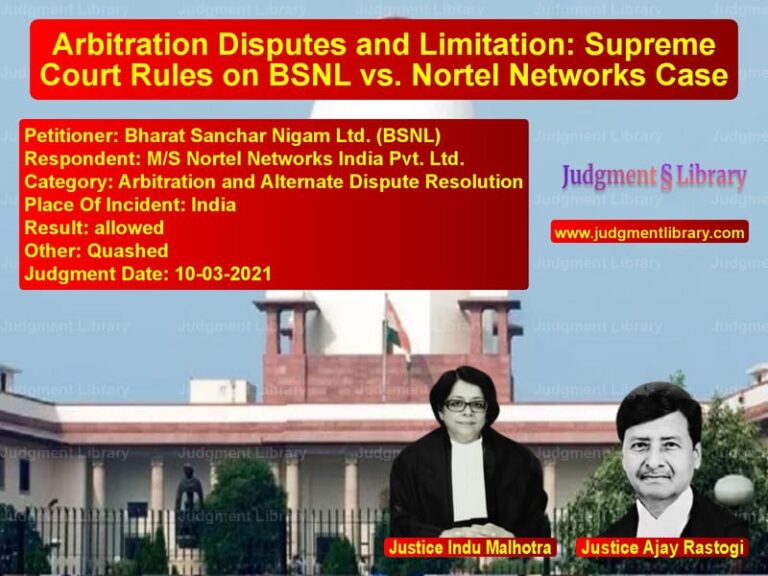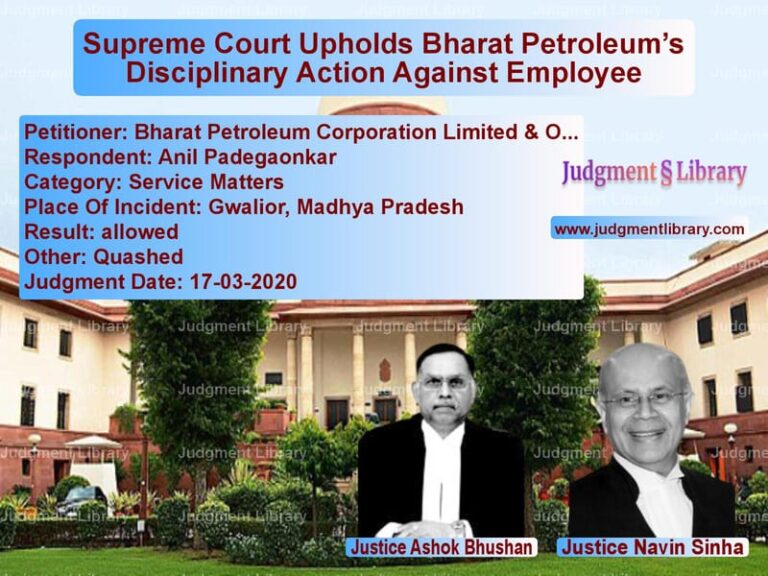Election Disqualification and Caste Certificate Validity: A Landmark Case Analysis
The case of Bharati Reddy v. The State of Karnataka & Ors. revolves around the disqualification of an elected official based on an allegedly fraudulent caste and income certificate. This case is significant as it examines the intersection of electoral laws, caste-based reservations, and judicial review under the Indian Constitution.
The dispute arose when Bharati Reddy was elected as a member of the Zilla Panchayat from the 13-Badanahatti Constituency in Karnataka, a seat reserved for the General (Women) category. Later, she contested and won the post of Adhyaksha (President) of the Ballari Zilla Panchayat, which was reserved for Backward Class-B (Women). However, allegations emerged that she had obtained her caste and income certificate fraudulently to qualify for the reserved position.
Background of the Dispute
Following the elections, certain voters and political opponents challenged Reddy’s eligibility, claiming she had falsely declared her income and caste status to qualify for the reserved post. These allegations led to a legal battle that reached the Supreme Court of India.
Arguments by the Petitioner
The petitioner, Bharati Reddy, argued that:
- Her caste and income certificate was legally issued by the jurisdictional authority and was valid unless canceled by the Caste Verification Committee.
- The challenge to her election was politically motivated, initiated by unsuccessful candidates who had no standing to file a writ petition.
- The Karnataka Panchayat Raj Rules allow only a member of the Panchayat to challenge an election, and therefore, the writ petition should have been dismissed.
- Article 243-O of the Constitution barred interference by courts in panchayat elections except through an election petition.
- Her income declarations in different affidavits were contextually accurate and did not constitute fraud.
Arguments by the Respondent
The respondents, including voters and political opponents, countered that:
- Bharati Reddy had submitted false information in her caste and income certificate application to qualify for the reserved post.
- The process of obtaining the caste and income certificate was suspicious, as it was issued on the same day she filed the affidavit.
- The affidavit presented different income details compared to earlier disclosures, proving that she had misrepresented facts.
- Her husband was a high-income contractor earning over Rs.1 crore per annum, which disqualified her from availing of the Backward Class reservation.
- Since she occupied a public office, a writ of quo warranto (a judicial review questioning the legality of holding office) was justified.
Judgment by the Karnataka High Court
The Karnataka High Court ruled against Bharati Reddy, concluding that:
“The issuance of the caste and income certificate was done in a mortal hurry, raising serious doubts about its validity.”
The High Court issued a writ of quo warranto, directing Bharati Reddy to vacate her office as Adhyaksha of the Ballari Zilla Panchayat. It, however, did not quash her caste and income certificate, instead referring the matter to the Caste Verification Committee for further scrutiny.
Supreme Court’s Analysis and Ruling
The Supreme Court reviewed the case and focused on the legal grounds for issuing a writ of quo warranto. It observed that:
- Quo warranto is an extraordinary judicial remedy that should be issued only when an officeholder lacks legal authority to hold their position.
- The caste and income certificate issued to Bharati Reddy was still valid and had not been officially canceled by the competent authority.
- The High Court had made serious allegations about the validity of the certificate but had not annulled it.
- The Caste Verification Committee was the appropriate body to determine the validity of the certificate, and the High Court should not have preempted its decision.
The Supreme Court ruled:
“As long as the caste and income certificate remains valid and in force, Bharati Reddy cannot be deemed to have usurped the public office without legal authority.”
It set aside the High Court’s decision and reinstated Bharati Reddy to her post, directing the Caste Verification Committee to expedite its inquiry and conclude it within two months.
Key Takeaways
- The Supreme Court reaffirmed that quo warranto should not be issued unless the officeholder’s disqualification is legally and indisputably established.
- The validity of caste and income certificates must be determined by the designated verification committees, not by courts.
- Challenges to elections must follow the prescribed statutory route, and courts should exercise restraint in election-related matters.
- The ruling strengthens procedural safeguards against politically motivated disqualification attempts.
Conclusion
The Supreme Court’s decision in this case reinforces the importance of due process in electoral disqualifications. While allegations of fraud in obtaining caste and income certificates should be thoroughly investigated, they must be adjudicated by the appropriate authorities before any judicial intervention can remove an elected official from office.
This ruling serves as a precedent for future cases involving election disqualifications based on caste and income reservations, ensuring that legal safeguards are upheld and politically motivated litigations are discouraged.
Petitioner Name: Bharati ReddyRespondent Name: The State of Karnataka & Ors.Judgment By: Justice Dipak Misra, Justice A.M. Khanwilkar, Justice D.Y. ChandrachudPlace Of Incident: Ballari, KarnatakaJudgment Date: 06-03-2018
Don’t miss out on the full details! Download the complete judgment in PDF format below and gain valuable insights instantly!
Download Judgment: Bharati Reddy vs The State of Karnata Supreme Court of India Judgment Dated 06-03-2018.pdf
Direct Downlaod Judgment: Direct downlaod this Judgment
See all petitions in Public Interest Litigation
See all petitions in Fundamental Rights
See all petitions in Separation of Powers
See all petitions in Judgment by Dipak Misra
See all petitions in Judgment by A M Khanwilkar
See all petitions in Judgment by Dhananjaya Y Chandrachud
See all petitions in allowed
See all petitions in Remanded
See all petitions in supreme court of India judgments March 2018
See all petitions in 2018 judgments
See all posts in Election and Political Cases Category
See all allowed petitions in Election and Political Cases Category
See all Dismissed petitions in Election and Political Cases Category
See all partially allowed petitions in Election and Political Cases Category







